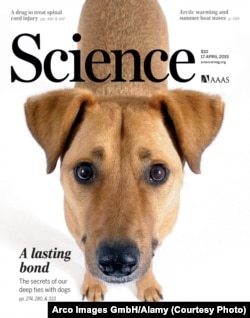Dogs serve in the military, work with police and assist the disabled. They have been by our side for thousands of years, serving as companions and loyal friends. We love them. They love us in return. The bond between a dog and its owner is a lot like that between a baby and its mother.
That connection, according to a Japanese study reported in the journal Science, is driven in part by oxytocin, a hormone active in the brain and body of both humans and dogs. Oxytocin can reduce stress, strengthen social relations, build trust and, in general, make you feel good. It is naturally released from the brain when you shake hands, get a hug or gaze into a loved one's eyes.
The researchers ran two experiments to try to establish the hormone's role in the cross-species relationship. They first observed a group of dogs and their owners for 30 minutes, measuring oxytocin levels before and after the session. They recorded every social interaction, including talking, touching and gazing.
Evan MacLean, co-director of Duke University's Canine Cognition Laboratory, who wrote a commentary that accompanied the study, said the results showed that gazing was boosted by oxytocin.
“It is only in this group of dogs that looked at their owners for long periods of time that they detected an increase in oxytocin in the owners and they also found a parallel increase of oxytocin in their dogs,” he said.
In a second experiment, the dogs got either a dose of oxytocin or a placebo saline spray up their snouts.
MacLean noted, “When they give dogs oxytocin, this actually caused the dogs to spend more time looking at their human owners, and as a consequence of that, the humans had an even bigger increase in oxytocin."
MacLean said knowing the biology of this so-called feedback loop can help promote new health strategies for people with disabilities, children with autism, or soldiers diagnosed with post-traumatic stress disorder.
“People report that they feel more secure, they report that they feel this bond with their animal, but we don’t know much about the biology of how this happens," he said. "This research, it certainly doesn’t tell us that it is the mechanism in those cases, but it suggests one possible pathway through which relationships with dogs may be therapeutic.”
MacLean said the biology of social relationships is complex, and while oxytocin is one piece of that puzzle, it is not the only element. Future work must consider whether the study results observed among the adult dog owners could be generalized to apply to children, to people with health problems or even across cultures.






